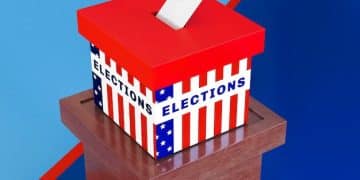Understanding Campaign Finance Law Changes & Their Impact on US Elections

Understanding the Proposed Changes to Campaign Finance Laws: What It Means for Elections involves examining potential amendments to regulations governing political donations and spending, assessing their influence on electoral processes.
The landscape of campaign finance in the United States is ever-evolving. Recent discussions surrounding potential revisions to campaign finance laws have sparked considerable debate. Understanding the Proposed Changes to Campaign Finance Laws: What It Means for Elections is crucial for anyone interested in fair and transparent elections.
What are these proposed changes, and how might they reshape the way campaigns are funded and conducted? Let’s delve into the intricacies of these regulations and their potential ramifications.
Understanding the Current Campaign Finance Laws
To fully grasp the implications of the proposed modifications, it’s crucial to first understand the existing framework. Current campaign finance laws in the US are a complex web of regulations designed to regulate how money is raised and spent in political campaigns, aiming for transparency and fairness.
Key Legislation Shaping Campaign Finance
Several landmark pieces of legislation have shaped the current landscape of campaign finance. Here are some of the most salient:
- Federal Election Campaign Act (FECA): Enacted in the 1970s, FECA introduced regulations on campaign contributions and expenditures and established the Federal Election Commission (FEC).
- Bipartisan Campaign Reform Act (BCRA): Also known as McCain-Feingold, this 2002 law aimed to further regulate the flow of money in political campaigns, particularly “soft money” contributions to political parties.
- Citizens United v. Federal Election Commission: This Supreme Court case in 2010 significantly altered campaign finance regulations by ruling that corporations and unions have the same First Amendment rights as individuals, allowing them to spend unlimited amounts of money on political advertising.
These laws and court decisions have created a system that is both heavily regulated and profoundly influenced by the flow of money from various sources.

The Role of the Federal Election Commission (FEC)
The FEC serves as the primary regulatory body responsible for enforcing campaign finance laws in the United States. Its responsibilities include:
- Overseeing campaign finance disclosure requirements.
- Enforcing contribution limits and prohibitions.
- Investigating potential violations of campaign finance law.
However, the FEC has often been criticized for its partisan gridlock and perceived inability to effectively enforce campaign finance laws, leading to calls for reform and stronger oversight.
Understanding the existing laws gives a base to see how the proposed changes to campaign finance could reshape elections. These regulations seek to address issues and create a fairer and more transparent electoral process.
The Core of Proposed Campaign Finance Reforms
The proposed changes to campaign finance laws aim to address issues within the current legal framework. These reforms are varied and ambitious, looking to refine campaign practices and encourage equal participation.
Key Proposals on the Table
The specific proposals being considered vary depending on the jurisdiction and the priorities of lawmakers, but some common themes emerge:
- Overturning Citizens United: Many advocates for campaign finance reform seek to overturn or significantly amend the Citizens United decision, which they argue has led to an influx of corporate and union money in politics.
- Increased Disclosure Requirements: Proposals often include measures to require greater transparency regarding the sources of campaign funding, including dark money groups that currently operate with little or no disclosure.
- Small-Dollar Donor Matching Systems: Some jurisdictions have implemented or are considering systems that match small-dollar donations with public funds, incentivizing candidates to focus on grassroots fundraising rather than large contributions from wealthy donors.
Each of these suggestions aims to level the playing field and lower the effect of large donors on political results. They highlight a wish for a more varied and responsible approach to campaign finance.
Arguments For and Against the Proposed Changes
Campaign finance reform is a contentious issue, and the proposed changes have generated both strong support and opposition. The arguments on both sides are multifaceted:
- Proponents argue that the reforms are necessary to reduce corruption, promote political equality, and ensure that elected officials are responsive to the needs of their constituents rather than wealthy donors.
- Opponents contend that the reforms infringe on free speech rights, stifle political participation, and could have unintended consequences. Some argue that increased disclosure requirements could chill donor participation, while others worry that small-dollar donor matching systems could be vulnerable to fraud or abuse.
The debate over these proposed changes highlights the tensions between competing values and interests in campaign finance regulation, balancing free speech, and fairness in elections.
These changes are being considered to refine our campaign landscape, and the discourse surrounding them is vital for a well-informed electorate. The implications of these adjustments can impact both candidates and constituents.

Understanding the Proposed Changes to Campaign Finance Laws: What It Means for Elections
Understanding the Proposed Changes to Campaign Finance Laws: What It Means for Elections requires a detailed consideration of how these regulations can transform the workings of political campaigns.
Potential Impacts on Campaign Strategies
If the proposed changes are enacted, they could profoundly alter the way campaigns are strategized and executed. For example:
- Candidates might need to rely more on grassroots fundraising efforts and less on large contributions from wealthy donors.
- Campaigns might need to devote more resources to disclosure compliance and transparency efforts.
- Super PACs and other independent expenditure groups might need to adjust their strategies in response to new regulations or restrictions.
These alterations can change the power dynamics in campaigns, possibly favouring candidates skilled at grassroots engagement and small-dollar fundraising.
The Role of Money in Political Discourse
Money plays an undeniable role in shaping political discourse. This influence underscores the importance of campaign finance reform in ensuring that diverse voices are heard and considered in politics.
- Amplifying Messages: Money allows campaigns to reach a wider audience through advertising, media outreach, and other forms of communication.
- Shaping the Narrative: Money can be used to frame issues, define opponents, and influence public opinion.
- Limiting Access: Candidates without access to significant financial resources may struggle to compete effectively.
By regulating the flow of money in politics, reformers aim to create a more equitable discourse where ideas and policies are judged on their merits, rather than on the financial resources of their proponents.
Ultimately, understanding the proposed changes to campaign finance laws: what it means for elections, is about identifying the values we prioritise in our democratic process. It demands balancing free speech and electoral integrity.
Implications for Voters
The changes in campaign finance laws have practical consequences for voters, altering how they interact with campaigns and how they perceive the political process.
Increased Transparency and Accountability
One primary goal of campaign finance reform is to promote greater transparency and accountability in politics. If the proposed changes are enacted, voters may benefit from:
- More information about the sources of campaign funding, allowing them to assess potential biases or conflicts of interest.
- Greater confidence that elected officials are responsive to the needs of their constituents rather than wealthy donors.
- A more level playing field in elections, where candidates without access to significant financial resources can compete effectively.
These advantages are critical for nurturing trust in the democratic process and empowering voters to make decisions.
Empowering Small-Dollar Donors
Small-dollar donor matching systems and other similar reforms aim to empower everyday citizens to play a more active role in campaign finance. By incentivizing candidates to focus on grassroots fundraising, these reforms can:
- Give ordinary voters a greater voice in politics.
- Promote a more inclusive and participatory democracy.
- Reduce the reliance on large contributions from wealthy individuals and special interests.
These measures seek to democratize campaign finance, enabling more individuals to invest in candidates and causes they care about.
Knowing the changes to campaign finance laws can educate and empower voters. It can lead to a more aware and involved electorate.
The Future of Campaign Finance Regulation
The conversation around campaign finance regulation is ever-ongoing, marked by continuous discussion and adaptation to new obstacles and opportunities. The future of campaign finance regulation in the United States is uncertain, but several key trends and challenges are likely to shape the debate in the years to come.
Potential for Further Reforms
Despite the challenges, there is a growing momentum for further reforms to address perceived shortcomings in the current system. Potential areas for future reform include:
- Strengthening enforcement of existing campaign finance laws.
- Closing loopholes that allow dark money groups to operate without disclosing their donors.
- Establishing independent redistricting commissions to reduce partisan gerrymandering.
These reforms could help address structural issues in campaign finance while ensuring that political processes are transparent, fair, and responsive to the people.
Adapting to New Technologies
The rise of the Internet and social media has created new avenues for political communication and fundraising, but it has also raised new challenges for campaign finance regulation. Policymakers need to consider how to adapt existing laws to address the unique challenges posed by digital media, such as:
- Regulating online advertising and political content.
- Protecting against foreign interference in elections.
- Ensuring transparency in online fundraising platforms.
Staying ahead of digital innovations will be critical to maintaining the integrity of campaign finance regulation in the digital age.
As we look forward, adjusting to the evolving landscape will be essential. This includes embracing new strategies to cultivate fairness and engagement in the political domain.
| Key Point | Brief Description |
|---|---|
| 🗳️ Current Laws | FECA, BCRA, and Citizens United case shape finance rules. |
| 💰 Proposed Reforms | Overturn Citizens United, increase disclosures, match small donations. |
| 📊 Impact on Elections | More grassroots campaigns, changed power dynamics from large donors. |
| 🤝 Voter Role | Increased transparency and influence through small donations. |
Frequently Asked Questions
The main goals include reducing corruption, promoting political equality, and making elected officials more responsive to constituents rather than just wealthy donors.
The Citizens United ruling allows corporations and unions to spend unlimited amounts on political advertising, which has led to a significant increase in the influence of big money in politics.
It’s a system where small donations are matched with public funds, encouraging candidates to focus on grassroots fundraising and reducing power from wealthy donors.
Opponents argue that reforms infringe on free speech rights, stifle political participation, and potentially lead to unintended consequences and vulnerabilities.
Increased disclosure requirements will help voters identify the sources of campaign funding, so they can assess biases or conflicts of interest, and be more informed voters.
Conclusion
In conclusion, understanding the proposed changes to campaign finance laws: what it means for elections, is very important for democracy in the US. The debates and legal challenges signal a continuous attempt to balance free speech with the need for fair and transparent elections.
As these reforms progress, it is vital for voters, policymakers, and stakeholders to stay informed and advocate for a system which reflects equity, transparency, and accountability, which will secure a healthy and representative democracy.





